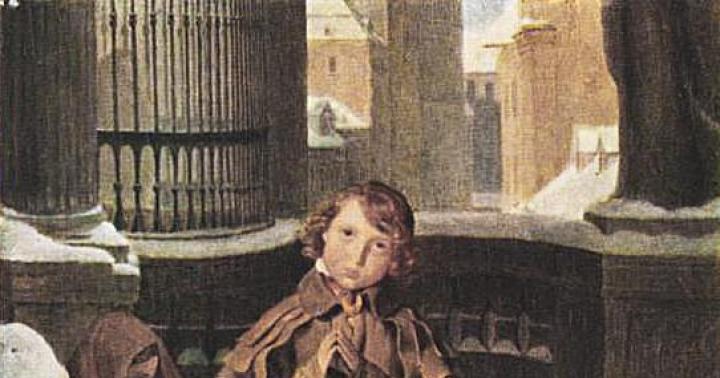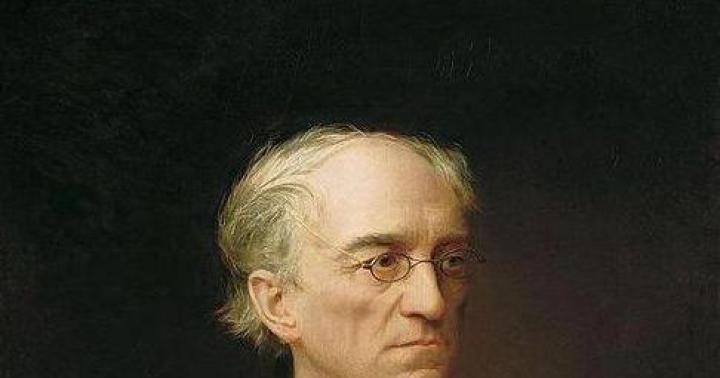Analysis of Tyutchev's poems "Summer Evening"
A year before writing "Autumn Evening" Tyutchev created "Summer ". These poems are closely related, though written in different keys:
The hot ball of the sun
The earth rolled off its head,
And a peaceful evening fire
The sea wave swallowed.
The bright stars have risen
And gravitating over them
Heavenly vault lifted
With their wet heads.
The airy river is fuller
Flowing between heaven and earth
The chest breathes easier and more freely,
Freed from the heat.
And sweet thrill, like a jet,
Nature ran through the veins,
Like hot feet
Key waters touched.
In the poem “Summer Evening”, the author practically does not mention the earth, but speaks more about the sky and stars. Everything tends to rise, to break away from the earth.
I highlighted all concepts related to the sky in bold type. The stars "lift" the vault of heaven. Everything “Summer Evening” is written in semitones: the stars “lifted” the sky, “a thrill ran through the veins”, the earth “rolled” the sun. There are no sharp movements in the poem, everything is smooth, slow. The poet is tormented by forebodings and anxieties, while in "Summer Evening" everything is peaceful, "the chest breathes easier and more freely."
This poem is dominated by light, calm colors. Contradictions are generally characteristic of Tyutchev's work. He often created opposite in mood and thought, as happened with the poems "Autumn Evening" and "Summer Evening". They can outline several directions of antithesis: top-bottom; light-dark; life death; peace-storm.
It seems to me that thanks to the comparison of these poems, I was able to show how perfectly Tyutchev could depict completely different landscapes, different states of nature and through them the variability of human states. The man in Tyutchev's poetry is twofold: he is weak and majestic at the same time. Fragile as a reed, doomed to death, powerless in the face of fate, he is great in his craving for the infinite. For the poet, there is no doubt the greatness of a person who turned out to be a participant or at least a witness to decisive historical events.
In Tyutchev's lyrics, a person realizes a previously unthinkable and frightening freedom: he realized that there is no God above him, that he is one on one with nature - the hope for "sympathy from heaven" has been lost. A person "craves faith, but does not ask for it," since "there is no point in praying." Tyutchev often expresses the motives of humanistic despair - he mourns over the fragility of the human race. But his poetry is always dominated by the voice of a fighter who defies fate.
Nature, like man, lives, according to Tyutchev, by its own forces. Tyutchev constantly compares man with nature - and often, it would seem, not in favor of man: human life is fragile, insignificant - nature is eternal, imperishable; nature is characterized by inner harmony, “an imperturbable order in everything” - a person is bifurcated, contradictory. However, the poet's verses do not just state the weakness of a person - they give rise to a lingering feeling of his discord with the outside world and a restless thought:
Tyutchev's nature helps a person to understand himself, to appreciate in himself the significance of purely human qualities: consciousness, will, individuality, to see that the spiritual elements depend on them. Consciousness itself seems to increase the “helplessness” of a person, but the disharmony generated by thought does not humiliate, but elevates him. Consciousness awakens the need for a "higher life", a thirst for an ideal.
Analysis of the poem "Summer Evening" by F.I. Tyutchev.
"The sun is a hot ball ..." - thus it proves the above lines.
In Fyodor Ivanovich’s soul, there was far from anxiety and excitement, depression and pressure, but when writing he was so light, so completely devoted to nature, nature which, in the evenings, reveals its beauties, during the day it is also noticeable, but there is no such a beautiful sunset, and then brightly sparkling stars. It can be concluded that this is a spiritualized poem, it conveys the state of the author's soul.
Today we will analyze the poem "Summer Evening" by Tyutchev. The landscape lyrics of this author are often compared with the works of the no less thoughtful and subtle romantic Athanasius Fet.
Close in sound
Before starting an analysis of the poem "Summer Evening" by Tyutchev, it should be noted that there is a significant difference in the manner of writing of the above authors. Afanasy Fet passes through himself what he saw, looking for an echo of his own emotional experiences and sensations in the landscapes dear to the heart. At the same time, Fyodor Tyutchev, trying to capture moments of natural transformation or admiring the change of seasons, abstracts from his own experiences, concentrating only on what he saw. The famous work, which we will consider today, is also sustained in this manner.
Fedor Tyutchev, "Summer Evening" - analysis of the poem
This creation of a poetic genius was created in 1866. Tyutchev at that time managed to survive a personal tragedy. He lost his beloved, as well as two children, but the work lacks any hint of what was happening in the author's soul at the time of writing. He appears as a contemplative who has managed to realize the brevity of life and realized that you need to fully enjoy each of its moments. Let's start the analysis of the poem "Summer Evening" by Tyutchev by noting that this is a very sensual and romantic poem, revealing new facets of Tyutchev's talent as a lyricist. The work has amazing figurativeness, romanticism and symbols characteristic of the work of this poet. Tyutchev again resorts to his favorite technique and identifies nature and a living being. With him, the world around him thinks, breathes, feels and transforms, creates the illusion of changeability.
Sunset

The poet compares the sun with an unusual hot ball - the headdress of the earth itself. She rolls it off her head before the evening comes. He was engulfed in "fire" swallowed up by the wave of the sea. The unusual style of presentation, which is characteristic of romanticism, tells in this poem about the sunset. Thanks to the talent of the author, the described phenomenon becomes an unforgettable and colorful spectacle. The poet revives the pale stars that first appear in the sky, describing how they lifted the vault of heaven with their wet heads. Tyutchev compares the air with a heavenly river, which, after sunset, flows more fully between earth and sky, giving a feeling of freshness, allowing you to breathe more fully and easier, freeing the world from heat. So we analyzed the poem "Summer Evening" by Tyutchev.
"Summer Evening" Fyodor Tyutchev
The hot ball of the sun
The earth rolled off its head,
And a peaceful evening fire
The sea wave swallowed.The bright stars have risen
And gravitating over us
Heavenly vault lifted
With their wet heads.The airy river is fuller
Flowing between heaven and earth
The chest breathes easier and more freely,
Freed from the heat.And sweet thrill, like a jet,
Nature ran through the veins,
How hot her legs
Key waters touched.
Analysis of Tyutchev's poem "Summer Evening"
The landscape lyrics of Fyodor Tyutchev are often compared with the works of the no less subtle and thoughtful poet Afanasy Fet. However, in the verses of these authors, devoted to the description of nature and the elevation of its beauty to the absolute, there is one significant difference. Afanasy Fet seems to let what he sees through himself, looking for consonance with his own feelings and emotional experiences in the landscapes so dear to his heart. At the same time, Fedor Tyutchev, admiring the change of seasons or trying to capture the elusive moments of the transformation of nature, completely abstracts from personal experiences, concentrating only on what he sees.
In a similar manner, the famous work of the poet “Summer Evening”, created in 1866, is sustained. Despite the fact that by this time Tyutchev had experienced a personal tragedy, having lost his beloved and two children, there is not a single hint in the work of what is happening in the poet's soul. He appears in the image of a contemplative who has already managed to realize that life is short, and you need to enjoy every moment of it, released by fate.
"Summer Evening" is a very romantic and sensual poem that reveals new facets of Tyutchev's poetic talent as a lyricist. This work contains both romanticism, and amazing imagery, and symbols that are characteristic of the work of this poet. In addition, Tyutchev again resorts to his favorite method of identifying nature with a living being that can think, breathe, feel and transform, creating an amazing illusion of the variability of the surrounding world. The poet compares the sun with a hot ball, which is the headdress of the earth. It was him that she “rolled off her head” before the onset of the evening, which was engulfed in a “fire”, suddenly swallowed up by a sea wave. The whimsical and somewhat pretentious style of presentation, characteristic of such a literary movement as romanticism, in this case tells of an ordinary sunset, which, thanks to Tyutchev's talent, turns into an unforgettable and colorful spectacle.
The poet also revives the first pale stars that appeared in the sky, believing that they "raised the vault of heaven with their wet heads." At the same time, Tyutchev compares the air with a heavenly river, which, after sunset, "flows more fully between heaven and earth", giving a long-awaited feeling of freshness, when "the chest breathes easier and fuller, freed from the heat." Indeed, the coolness of a summer evening can be compared to a stream of water that brings with it freshness and life-giving power, as if giving a long-awaited rest to a tired and heat-exhausted nature. At the same time, the poet emphasizes with what relief and gratitude the surrounding world accepts this priceless gift from heaven, which causes a “sweet thrill” for all life on earth. At the same time, Tyutchev compares nature with a beautiful, but tired maiden, for whom the evening coolness is a source of new strength before the next hot day, "as if hot springs touched her feet."
In the poem "Summer Evening" there are several images that the author builds in a clear sequence, creating his own hierarchy of values. At the same time, the sun, stars, sky and air are only part of nature, but thanks to the very refined metaphors of the poet, they turn into independent heroes of the work. Nevertheless, in the final lines of the poem, Tyutchev emphasizes that mother nature is the true sorceress and worker, thanks to which all these amazing metamorphoses occur, which so struck the poet and inspired him to create this amazingly romantic work.
The hot ball of the sun
The earth rolled off its head,
And a peaceful evening fire
The sea wave swallowed.
The bright stars have risen
And gravitating over us
Heavenly vault lifted
With their wet heads.
The airy river is fuller
Flowing between heaven and earth
The chest breathes easier and more freely,
Freed from the heat.
And sweet thrill, like a jet,
Nature ran through the veins,
How hot her legs
Key waters touched.
Analysis of the poem "Summer Evening" by Tyutchev
Fedor Ivanovich Tyutchev often describes in his works the beauty of the nature around him. Even in the most difficult times for himself, he abstracts from internal experiences and pays attention to what is happening around. Unlike, with whom Tyutchev is often compared, the latter does not let nature "through himself", but only observes what is happening.
The work "Summer Evening" is designed in a romantic and sensual style familiar to the poet's admirers. It contains both symbolism, imagery, and the personification of nature and its phenomena. Nature itself appears before the reader as a living, feeling and thinking being, capable of amazing transformations.
As in many of Tyutchev's works, the main theme of "Summer Evening" is the need to enjoy life and the surrounding world, the need to see beauty in the sunset, the breath of the wind, the twinkling of the first stars. Nature is changeable, and human existence is unpredictable. This idea runs like a red line through many of the poet's poems.
The poem belongs to the genre of landscape lyrics, in which a certain philosophy is also felt as a second meaning: a subtext about the finiteness of the life of every person. This can be justified by the fact that the work was written during the period of the poet's personal tragedy - he buried his wife and two daughters. And even despite his inner worries, he finds the strength and time to enjoy the sunset and the cool wind that came after a hot day. So after the hot feelings and emotions of a person, peace and tranquility will come, a certain coolness in the sensations.
In the poem, all nature is presented as a single being, a beautiful maiden, tired on a hot day. Like a living person, she takes off her heavy headdress and the burden of the past day, and the evening coolness, like spring water that touches her feet, refreshes and prepares for the coming day.
The work is written in iambic tetrameter, characteristic of the poet's work, with cross-rhyming. Of the literary devices, a large number of epithets are noted (“spring waters”, “bright stars”, “hot ball”, etc.), personifications characteristic of Tyutchev (“veins of nature”, “the earth rolled down”, “the stars lifted”), metaphors ("the wave swallowed the fire of the evening"). An unusual antithesis appears as a separate line - the representation of air as a river flowing "between heaven and earth" and in which the hero "breathes easily", but figuratively - under water.


